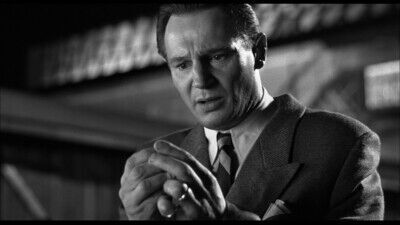Released thirty years ago last month, “Schindler’s List” went on to become a genuine blockbuster, finishing fourth at the international box office for 1993 (behind only “Jurassic Park,” “Mrs. Doubtfire,” and “The Fugitive”). It also became an Oscar juggernaut, with 12 nominations and seven wins, including Best Picture and Steven Spielberg’s long-awaited first win for Best Director. Rewatching “Schindler’s List” today, I’m once again staggered at how it balances both hope and hopelessness more effectively than perhaps any other film ever has. It’s a story that concludes with one of the strongest and most unforgettable sequences of hope to ever grace cinema screens, but the journey to that catharsis submerges the viewer in nearly three hours of genocide, uncompromising in its portrayal.
The film was adapted from Thomas Keneally’s 1982 historical novel, Schindler’s Ark, which detailed how Oskar Schindler, a German industrialist and member of the Nazi party, transitioned from war profiteering off Jewish slave labor in the early years of WWII, to eventually spending his fortune to buy the lives of 1,200 Jews from the Nazis in the closing months of the war, saving them from near-certain death at Auschwitz. Universal Studios quickly bought the film rights to the book and Spielberg was attached almost immediately, but he didn’t believe he was ready for the material, and he spent years trying to recruit other directors onto the project—including Martin Scorsese, Sydney Pollack, and Roman Polanski (a Holocaust survivor who eventually directed 2002’s “The Pianist”)—before finally deciding to mount it himself.

The legacy of the film looms large in several different ways, both for the film industry and for our collective understanding and preservation of Holocaust stories. Most obviously, it led to Spielberg establishing the Shoah Foundation in 1994, which has become one of the world’s most invaluable resources for Holocaust accounts, research, and education. But given how much “Schindler’s List” became synonymous for audiences with Hollywood prestige and awards success in the ‘90s, the film’s critical legacy has become curiously almost non-existent. For example, it has never appeared on one of Sight & Sound’s once-per-decade polls of the greatest films of all time, including 2022’s extended top 250 list.
Sumber: www.rogerebert.com
 Skip to content
Skip to content






